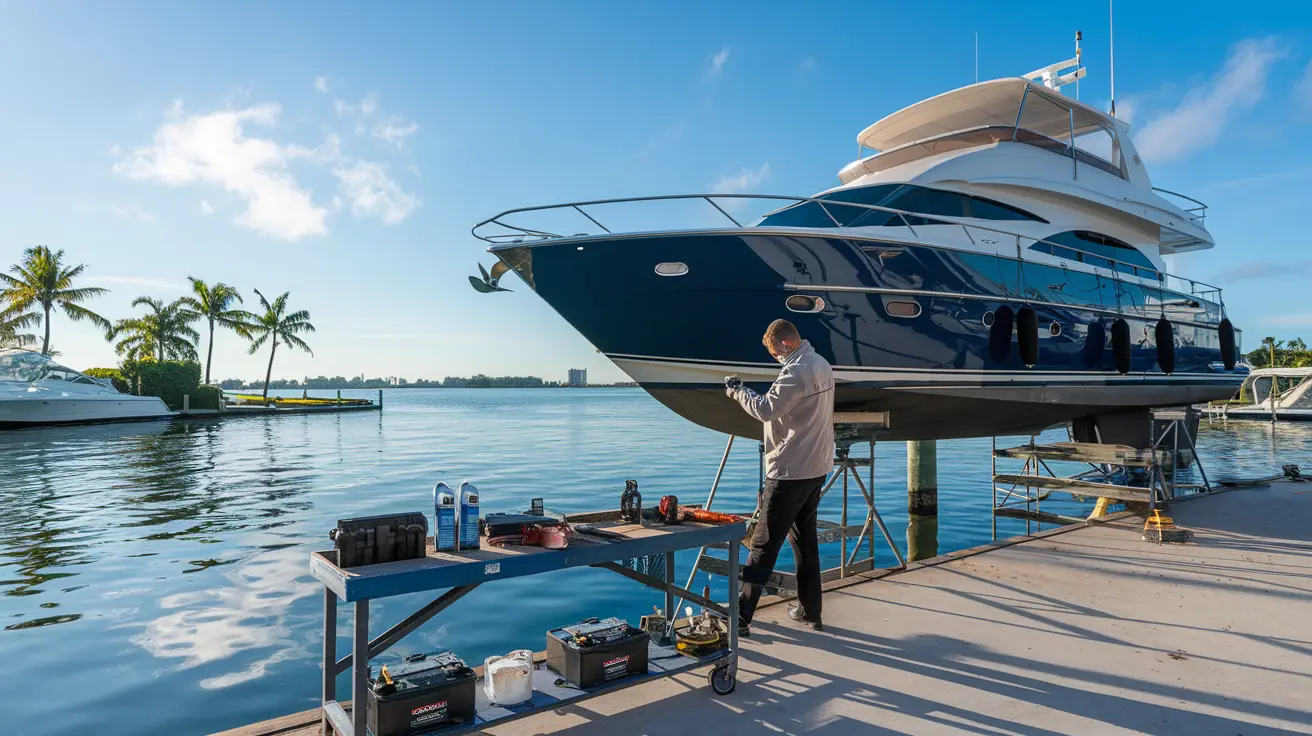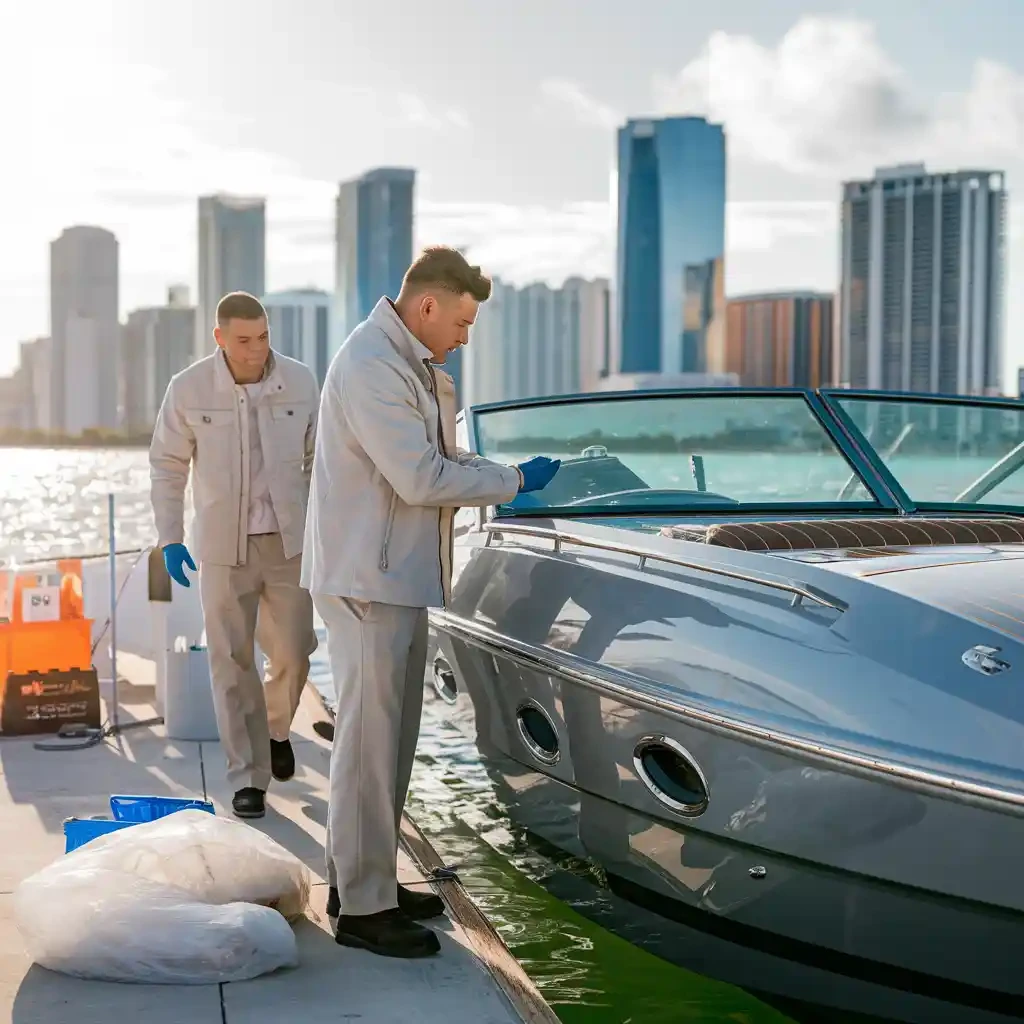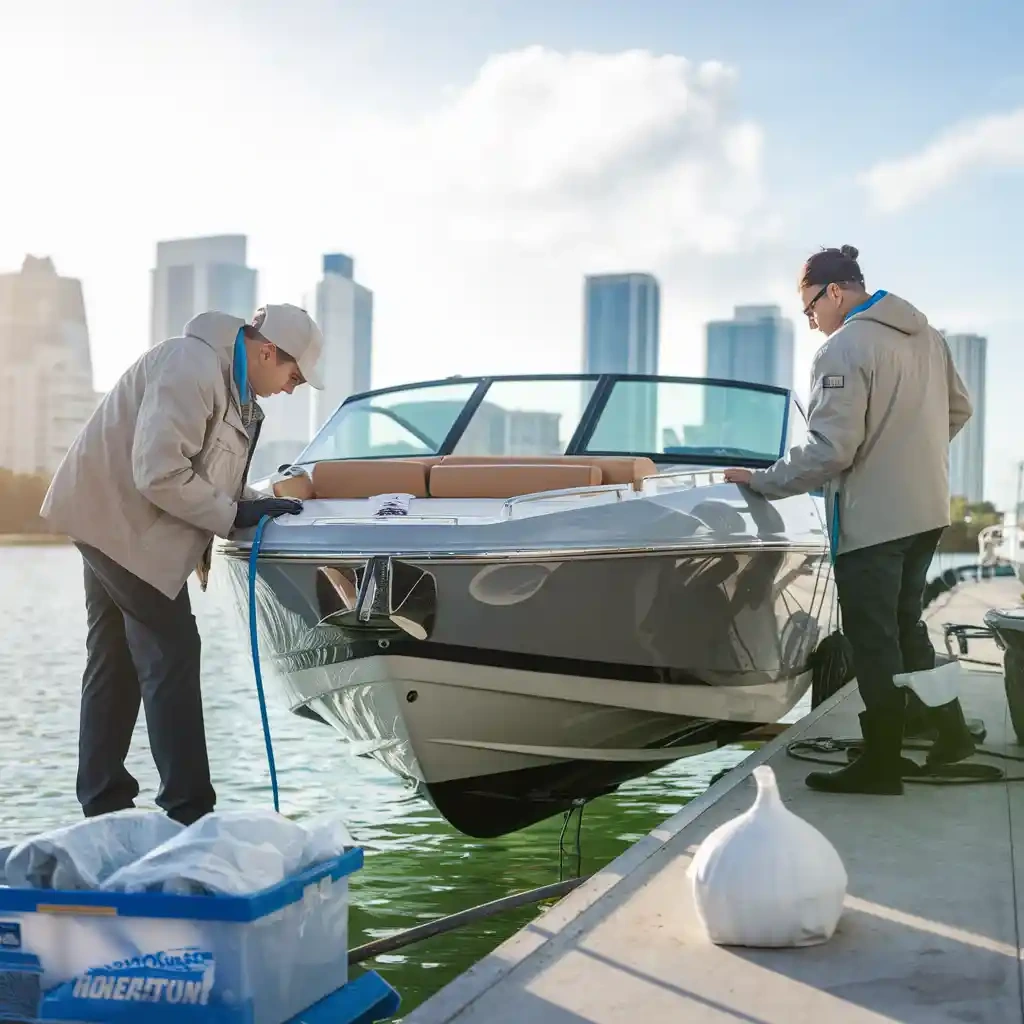Winterization and Seasonal Boat Maintenance in Miami, FL
April 26, 2025 |
By Ali

Winterization and seasonal boat maintenance in Miami may not seem like a big deal, since we don’t experience harsh winters. However, the unique subtropical climate brings its own set of challenges that boat owners need to tackle. From humidity to saltwater damage, understanding how to care for your boat year-round is crucial for keeping it in top shape. This guide will walk you through the essential steps to ensure your vessel is ready for the Miami waters, no matter the season.
Key Takeaways
- Regular maintenance prevents costly repairs down the line.
- Humidity and saltwater can seriously damage your boat if not addressed.
- Winterization steps are still important, even in Miami’s mild winters.
- DIY maintenance can save you money, but know when to call a pro.
- Investing in quality materials and protection enhances your boat’s lifespan.
Understanding Seasonal Changes in Miami
While Miami doesn’t have the same drastic seasonal shifts as northern regions, there are still important variations that affect boat maintenance. Smart boaters adjust their routines to account for these changes, ensuring their vessels stay in top condition year-round. It’s not just about avoiding major damage; it’s about maximizing your boat’s lifespan and performance.
Impact of Humidity on Boat Maintenance
Humidity is a constant factor in Miami, but it peaks during the summer months (May-October). This increased moisture can accelerate corrosion and promote the growth of mold and mildew. During these months, it’s important to:
- Increase freshwater rinses to remove salt buildup.
- Apply additional UV protectants to combat sun damage.
- Check cooling systems more frequently, as higher water temperatures reduce their efficiency.
Temperature Variations and Their Effects
Even though Miami enjoys warm weather year-round, there are temperature differences between summer and winter. These variations can affect your boat’s systems. For example, higher temperatures can put extra strain on cooling systems, while cooler, drier winter months offer a chance to thoroughly dry out bilges and enclosed spaces. It’s a good idea to check sacrificial anodes monthly.
Planning Maintenance Around Seasonal Patterns
Adjusting your maintenance schedule to match Miami’s seasonal patterns can significantly extend your boat’s life. Here’s a general guideline:
- Summer (May-October): Focus on frequent cleaning, UV protection, and cooling system checks.
- Winter (November-April):* Take advantage of lower humidity to perform more extensive maintenance, such as changing engine oil and filters. Apply fresh bottom paint before spring to prevent marine growth. Consider using a mobile marine mechanic service in Miami for complex tasks.
By understanding these seasonal changes and adjusting your maintenance routine accordingly, you can keep your boat in excellent condition and enjoy smooth sailing in Miami’s beautiful waters.
Essential Winterization Steps for Boats
Draining and Flushing the Cooling System
Okay, so first things first, you have to deal with the cooling system. It’s not as hard as it sounds, trust me. The main thing is to get all the water out. Water expands when it freezes, and that can crack your engine block. Not good.
Here’s a simple way to do it:
- Locate all the drain plugs on your engine.
- Open them up and let the water drain completely.
- Flush the system with antifreeze to protect against corrosion and freezing. Make sure you use the right kind of antifreeze – the stuff made for boats.
I remember one time, my buddy didn’t drain his cooling system properly, and he ended up with a cracked engine block. Cost him a fortune to fix. Don’t be like my buddy.
Changing Engine Oil and Filters
Next up, let’s talk about oil. Old oil is bad news. It can get acidic and corrode your engine from the inside out. Plus, the filters get clogged, which means your engine isn’t getting the oil it needs. Changing the oil and filters is a pretty easy way to keep things running smoothly.
Here’s what you need to do:
- Warm up the engine a bit to make the oil flow easier.
- Drain the old oil.
- Replace the oil filter.
- Pour in fresh oil of the correct type and amount.
Preparing the Fuel System for Storage
Alright, last but not least, we need to prep the fuel system. Fuel can go bad over time, especially with ethanol in it. It can gum up your fuel lines and carburetors, which is a pain to clean.
Here’s the lowdown:
- Add a fuel stabilizer to your fuel tank.
- Run the engine for a bit to circulate the stabilized fuel through the system.
- Consider filling the fuel tank completely to minimize condensation.
Routine Maintenance for Year-Round Boating
Weekly Checks That Save Your Boat
Even if your boat hasn’t left the dock, the Miami environment is constantly working against it. A quick weekly check can prevent big problems down the road. It’s easy to underestimate the impact of salt air and humidity, but trust me, it adds up.
Here’s what I do every week:
- Give the exterior a freshwater rinse, even if I haven’t been out on the water.
- Wipe down any metal surfaces with a rust inhibitor.
- Check the battery connections for any signs of corrosion.
- If the boat’s in the water, I’ll run the engine briefly to prevent growth on underwater parts.
- Make sure all covers and canvas are secure to stop rain and dew from collecting.
I’ve seen boats in way worse shape just because the owners skipped this simple weekly routine. It really makes a difference, especially if you keep your boat in a marina where it’s constantly exposed to salt spray.

Monthly Deep Checks That Find Problems Early
Once a month, I set aside a few hours for a more thorough inspection. This is when I really get into the nitty-gritty and look for potential issues before they become major headaches. Early detection is key.
Here’s my monthly checklist:
- Check all the sacrificial anodes and replace them if they’re more than 50% gone.
- Inspect all through-hull fittings for any signs of rust.
- Test all the electrical systems and electronics to make sure everything’s working properly.
- Examine the steering and throttle controls to make sure they’re operating smoothly.
- Look for any discoloration around metal fittings and hardware, which could indicate corrosion.
This monthly check is super important, especially if you’re boating around areas where there’s a lot of activity, because that can really speed up corrosion.
Annual Professional Inspections and Services
While I handle a lot of the routine maintenance myself, there are some things that are best left to the pros. An annual inspection by a qualified marine mechanic is a must. They have the tools and the knowledge to spot problems that I might miss.
Here’s what I typically have them do:
- Engine service: This includes changing the oil and filters, checking the cooling system, and inspecting the fuel system.
- Outdrive inspection: They’ll check for any signs of wear or corrosion and lubricate as needed.
- Electrical system check: They’ll test the wiring, connections, and battery health.
| Service | Frequency | Notes |
|---|---|---|
| Engine Oil Change | Annual | Or every 100 hours of use |
| Cooling System Flush | Annual | Prevents overheating |
| Anode Replacement | Annual | Protects against galvanic corrosion |
| Hull Inspection | Annual | Checks for damage, blisters, etc. |
| Fluid levels inspection | Annual | Ensures proper lubrication and operation of various systems. |
Getting a professional inspection every year gives me peace of mind knowing that my boat is in good shape and ready for another year of boating.
Protecting Your Boat from Saltwater Damage
Saltwater is relentless. It’s not just water with salt; it’s a cocktail of minerals that accelerate chemical reactions, slowly eating away at your boat. In Miami, the combination of high salt concentration, year-round heat, and humidity creates a perfect storm for corrosion. The damage often starts in hidden spots, making early detection difficult.
Identifying Vulnerable Areas on Your Boat
Not all parts of your boat are equally susceptible to saltwater damage. Knowing the weak spots can save you a lot of money and frustration. Metal fittings, rails, and hardware are usually the first to show signs. Even stainless steel isn’t truly stainless in saltwater; it just lasts longer. Aluminum parts, like trim and T-top supports, are especially vulnerable. Electrical systems are also at high risk, with corrosion leading to malfunctions. Regular checks of these areas are crucial.
Applying Rust Inhibitors and Protectants
Beyond rinsing, protective coatings create a barrier between your boat and saltwater. Applying rust inhibitors and protectants is a proactive step in combating corrosion. Here’s a simple routine to follow:
- Clean the surface thoroughly to remove any existing salt or corrosion.
- Apply a marine-grade rust inhibitor to metal parts.
- Use a protectant spray on electrical connections to prevent corrosion.
Regular application of these products can significantly extend the life of your boat’s components. It’s a small investment that pays off in the long run.
Using Advanced Coatings for Enhanced Protection
For superior protection, consider advanced coatings. These coatings create a durable barrier against saltwater, reducing the need for frequent maintenance. Options include epoxy coatings, ceramic coatings, and specialized marine waxes. These advanced solutions offer enhanced durability and can protect your boat for extended periods. The initial investment is higher, but the long-term benefits are worth it for boat owners serious about protecting their investment.
DIY Maintenance vs. Professional Help
Tasks You Can Handle Yourself
So, you’re thinking about getting your hands dirty with some boat maintenance? Awesome! There are definitely things you can tackle yourself to save some cash. Simple stuff like washing the boat down after each use is a no-brainer. Rinsing off all that saltwater is super important to prevent corrosion. You can also handle basic cleaning, like wiping down surfaces and vacuuming.
Here’s a quick list of DIY-friendly tasks:
- Washing and waxing the hull
- Cleaning the interior
- Checking fluid levels (oil, coolant, etc.)
- Inspecting hoses and belts for wear
- Replacing zinc anodes (after you learn how, of course!)
When to Call in the Experts
Okay, let’s be real. Some boat stuff is best left to the pros. Messing with the engine internals, electrical systems, or anything structural can quickly turn into a disaster. It’s better to pay a professional now than to end up with a huge repair bill later. Plus, they have the tools and knowledge to diagnose problems accurately.
Here’s when you should definitely call a professional:
- Engine repairs or overhauls
- Electrical system troubleshooting
- Fiberglass or hull repairs
- Steering or control system issues
- Any work involving fuel systems
Trying to fix something you don’t understand can lead to more damage and potentially dangerous situations. It’s not worth the risk. If you’re unsure, always consult a qualified marine technician.
Balancing Cost and Expertise
Finding the sweet spot between DIY and professional help is key to keeping your boat in top shape without breaking the bank. Think about what you’re comfortable doing and what you’re not. Maybe you can handle the routine maintenance, but you’ll leave the big stuff to the pros.
Consider these factors when deciding:
- Your skill level: Be honest with yourself about what you can handle.
- The complexity of the task: Is it a simple fix or a major overhaul?
- The potential consequences of failure: Could a mistake lead to further damage or safety issues?
- Your budget: How much are you willing to spend on professional help?
| Task | DIY Difficulty | Potential Cost Savings | Professional Cost |
|---|---|---|---|
| Washing and Waxing | Easy | $100 – $300 | $200 – $500 |
| Oil Change | Medium | $50 – $100 | $150 – $300 |
| Engine Repair | Hard | $0 | $500+ |
| Electrical Troubleshooting | Hard | $0 | $300+ |
By carefully evaluating each task, you can create a maintenance plan that works for your boat and your wallet.

Maximizing Boat Longevity in Miami Waters
Understanding the Importance of Preventive Maintenance
Living in Miami means your boat faces a unique set of challenges. The saltwater, intense sun, and high humidity can really take a toll. That’s why preventive maintenance is so important. It’s not just about keeping your boat looking good; it’s about protecting your investment and ensuring it lasts for years to come. Regular maintenance saves money in the long run by preventing boat costly repairs in miami.
Investing in Quality Materials and Services
When it comes to boat maintenance, you often get what you pay for. Cheaping out on materials or services might save you a few bucks upfront, but it can lead to bigger problems down the road. For example, using a low-quality bottom paint might mean you have to haul out and repaint more frequently. Similarly, using the wrong type of rust inhibitor can actually make corrosion worse. Investing in quality materials and services from the start can save you time, money, and headaches in the long run.
Monitoring and Adjusting Maintenance Routines
Every boat is different, and every boater has different needs. A weekend warrior who only uses their boat a few times a month will have different maintenance requirements than someone who lives aboard and cruises every day. It’s important to monitor your boat’s condition and adjust your maintenance routines accordingly. Pay attention to early warning signs of problems, such as discoloration around fittings or stiff controls.
And don’t be afraid to seek professional help when you need it. A good mobile marine mechanic service in Miami can help you identify potential problems and keep your boat in top condition.
Think of your boat like a car. You wouldn’t skip oil changes or ignore strange noises, would you? The same principle applies to boat maintenance. Regular check-ups and timely repairs are essential for keeping your boat running smoothly and avoiding major breakdowns.
Here’s a simple table to illustrate the benefits of regular maintenance:
| Maintenance Task | Frequency | Benefit |
|---|---|---|
| Engine Oil Change | Every 100 hours or annually | Prevents engine damage and extends engine life |
| Bottom Cleaning | Monthly | Prevents marine growth and improves fuel efficiency |
| Zinc Anode Replacement | As needed (when 50% depleted) | Protects metal parts from corrosion |
Here are some things to keep in mind:
- Increase freshwater rinses during the summer months due to higher humidity.
- Apply additional UV protectants to prevent sun damage.
- Check cooling systems more frequently as higher water temperatures reduce efficiency.
Advanced Technologies for Boat Protection
Innovative Coatings for Enhanced Durability
Traditional waxes? They’re okay, but honestly, they don’t hold a candle to what’s out there now. Think ceramic coatings – these are a game-changer. They’re made with silicon dioxide and create a super strong barrier against water, salt, and even those harsh UV rays we get all year round here. Sure, they cost more upfront, but they last way longer, like a year or two per application. Totally worth it if you ask me.
Utilizing Modern Maintenance Tools
It’s not just about elbow grease anymore; technology is making boat maintenance way easier. We’re talking about things like:
- Ultrasonic cleaners: Perfect for getting grime off small parts without harsh chemicals.
- Infrared thermometers: Spotting engine hotspots before they become big problems.
- Moisture meters: Finding hidden leaks before they cause serious damage.
Investing in some of these tools can save you a ton of time and money in the long run. Plus, you’ll feel like a total pro!
Emerging Trends in Marine Protection
Things are always changing, and boat protection is no exception. Keep an eye out for these trends:
- Improved antifouling paints: They last longer and are better for the environment.
- Better monitoring systems: They can detect even small problems early.
- Special alloys: They are made to resist corrosion in saltwater.
These new technologies can really help extend the life of your boat, especially in a tough environment like Miami. It’s worth doing some research to see what’s new and what might work for you.
Wrapping Up Your Winterization and Maintenance Routine
So, there you have it. Winterizing and keeping up with boat maintenance in Miami isn’t just about protecting your investment; it’s about enjoying your time on the water without worries. Sure, it takes some effort, but a little bit of care goes a long way. Whether you’re rinsing off salt or checking the engine, these steps help keep your boat in good shape. Remember, every boat is different, and what works for one might not work for another. Tailor your approach based on how you use your boat.
And if things get tricky, don’t hesitate to call in the pros. They know the ins and outs of Miami’s waters and can help you out. Happy boating!
Frequently Asked Questions
What should I do to prepare my boat for winter in Miami?
Even though Miami has mild winters, you still need to take some steps. Start by flushing the cooling system and changing the oil. Make sure to add fuel stabilizer and check the battery.
How often should I check my boat during the summer months?
You should check your boat weekly during summer. Rinse it with fresh water, check for rust, and ensure everything is in good shape.
When is the best time to do maintenance on my boat?
The best time for maintenance in Miami is during the winter months when humidity is lower. This is when you can do more extensive work.
What are the signs that I need professional help with my boat?
If you notice strange noises, rust, or issues with the engine or electrical systems, it’s time to call a professional.
How can I protect my boat from saltwater damage?
You can protect your boat by applying rust inhibitors, using advanced coatings, and regularly cleaning it to prevent salt buildup.
What maintenance tasks can I do myself?
You can handle cleaning, checking for rust, and some basic inspections. However, leave engine repairs and electrical work to the experts.

Ali
Ali Hassan is a seasoned SEO content writer with over 10 years of experience in crafting high-performing content for WordPress websites. Specializing in keyword-rich blog posts, landing pages, and service descriptions, Ali blends technical SEO knowledge with engaging storytelling to drive organic traffic and improve search engine rankings.

